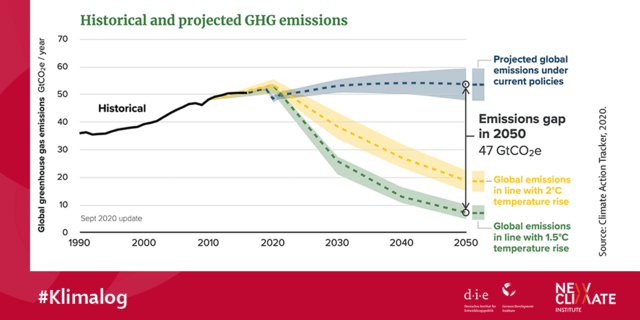Study shows importance of developing and emerging countries for successful international climate policy
Study shows importance of developing and emerging countries for successful international climate policy
Press release of 20 September 2021
Bonn / Köln, 20 September 2021
The next ten years are crucial for stabilising the global temperature rise at 1.5 °C. A new study by the German Development Institute / Deutsches Institut für Entwicklungspolitik (DIE) and NewClimate Institute shows how international cooperation can contribute to implementing the goals of the Paris Agreement worldwide. The study, written by ten scientists from various disciplines, highlights the important role played by developing and emerging countries to achieve a sustainable global transition.
Irreversible changes in the Earth's climate system hit the poorest people in developing and emerging countries particularly hard. If the goals of the Paris Agreement are missed, a just and sustainable global development remains unattainable in the long run, according to a central conclusion of the study.
Currently, the emissions of industrialised countries are stagnating at high levels. The emissions of developing countries and emerging economies continue to rise and already account for two-thirds of total global greenhouse gas emissions. In the medium term, low-middle income countries and poorer developing countries will contribute significantly to global emissions.
Prof. Dr Anna-Katharina Hornidge, Director of DIE, therefore emphasises: “The industrialised countries bear a substantial responsibility as the historical perpetrators of climate change. Nevertheless, the goals of the Paris Agreement can only be achieved with all countries, including developing and emerging economies, on board. Yet, their climate policy efforts depend on their own climate policy ambitions, as well as on credible, predictable and reliable support from the industrialised countries.”
According to the study, global energy consumption is the linchpin for a stable climate. Therefore, the supply and demand of emission-intensive energy must be reduced. An effective CO2 price, the gradual dismantling of subsidies for fossil fuels, the implementation of border adjustment measures and improved risk management can make a decisive contribution to creating favourable framework conditions at national and international levels. In this way, development policy can support the shaping of transformative change in developing countries and emerging economies.
Prof. Dr. Niklas Höhne, Founder of NewClimate Institute, emphasises: “More and more countries are declaring their intention to achieve net zero emissions in the near and medium-term. This is an encouraging sign for growing momentum in climate protection. It is now important to set the right course in good time and to ensure that these words are followed by deeds through progressive national policy-making and targeted international cooperation. The next decade is crucial.”
The study was financed by the German Federal Ministry for Economic Cooperation and Development (BMZ). Dr. Gerd Müller, Federal Minister for Economic Cooperation and Development, says: “Time is running out if we want to keep the 1.5°C target alive. And it is equally true to say that sustainable development is not possible without a resolute global policy to tackle climate change. The new DIE/NCI study underlines that we need to overcome our tunnel vision on climate action with its narrow focus on national answers. Emerging and developing countries are central to achieving the climate targets.“
The researchers emphasise that it is essential for effective climate and development policy that all countries formulate more ambitious national climate contributions (NDCs) and develop long-term strategies (LTS) for decarbonisation, as stipulated in the Paris Agreement. In order to improve the international conditions for transformative change, it is also important that the international financial system is aligned with the goals of the Paris Agreement and that the funds for international climate financing are increased.
The authors make concrete recommendations for five policy areas at the intersection of climate policy and sustainable development. They show how, within the framework of stronger international cooperation, it can be possible to modernise power generation worldwide, to make urbanisation climate-friendly, to secure the world's food supply with low emissions, to protect forests and ecosystems and to use water sustainably. Project examples from Uganda, Bangladesh, Madagascar, Indonesia and Zambia underline the promising possibilities of targeted climate and development cooperation in these fields of action.
Read the study here: https://t1p.de/IC-PA
Learn about the main recommendations in our video:
NewClimate Institute
NewClimate Institute gGmbH is a science-based non-profit institute based in Cologne and Berlin. Since 2014, the NewClimate Institute has been actively involved in shaping climate policy based on scientific findings and, as such, intensively follows the national and international climate discourse. The focus of its expertise is on the development and evaluation of climate policy measures and strategies, the development and implementation support of mitigation strategies, and international climate finance.
Scientific Contact
Dr. Steffen Bauer
Senior Researcher and Head of Klimalog
E-mail Steffen.Bauer@idos-research.de
Phone +49 (0)228 94927-153


![[Translate to English:] Logo: Newclimate Institute](/fileadmin/_processed_/0/1/csm_newclimate_logo_neg_rgb_141029_a6214e458c.png)
